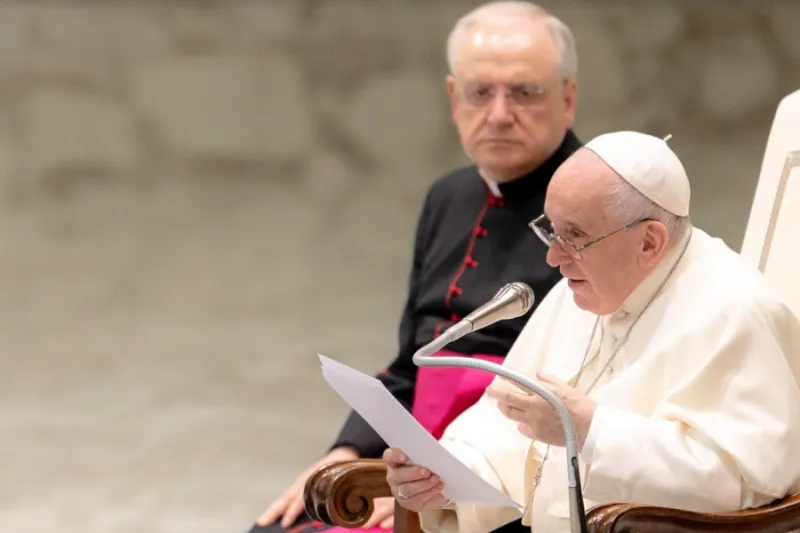
Vatican City, Oct 13, 2021 / 05:45 am (CNA).
Pope Francis spoke Wednesday about the universal nature of the Catholic Church, which embraces all cultures because Christ died for all people.
“This is the meaning of calling ourselves Catholics, of speaking of the Catholic Church: it is not a sociological denomination to distinguish us from other Christians. Catholic is an adjective that means ‘universal,’” Pope Francis said in the Vatican’s Paul VI Hall on Oct. 13.
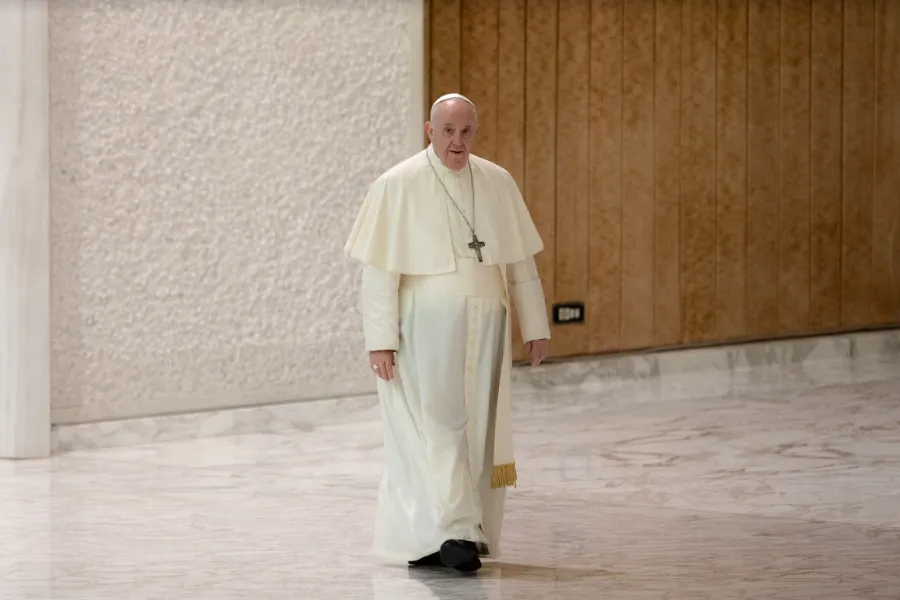
“The Church contains within herself, in her very nature, an openness to all peoples and cultures of all times, because Christ was born, died, and rose for everyone,” he said.
The word “Catholic” comes from the Greek word “katholikos” (καθολικός), which means “universal.” The term was first used by St. Ignatius of Antioch, who wrote in the second century that “wherever Jesus Christ is, there is the Catholic Church.”
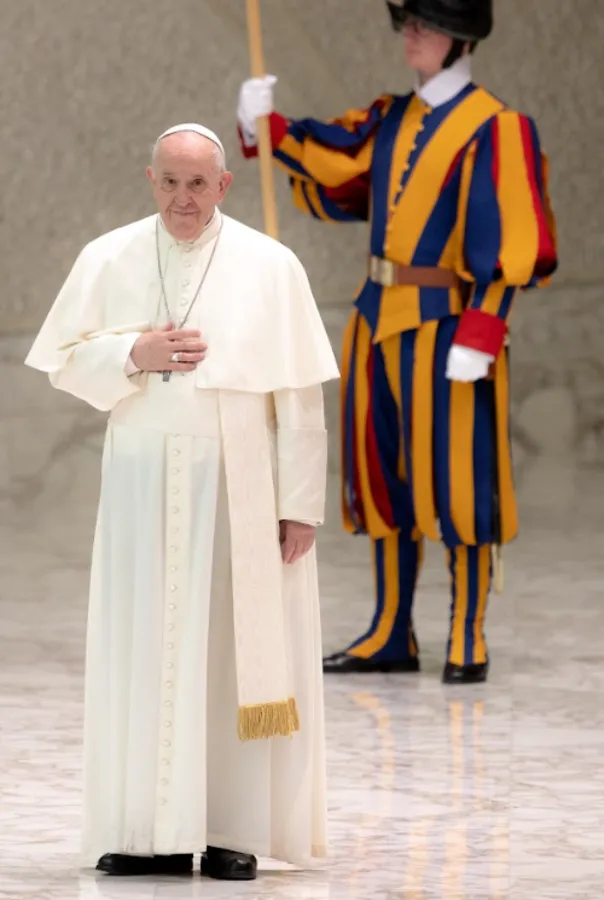
In his weekly general audience, Pope Francis reflected on St. Paul’s Letter to the Galatians, chapter five, verse 13: “For you were called for freedom, brothers. But do not use this freedom as an opportunity for the flesh; rather, serve one another through love.”
Pope Francis said: “In the call to freedom we discover the true meaning of the inculturation of the Gospel … being able to announce the Good News of Christ the Savior while respecting the good and the true that exist in cultures.”
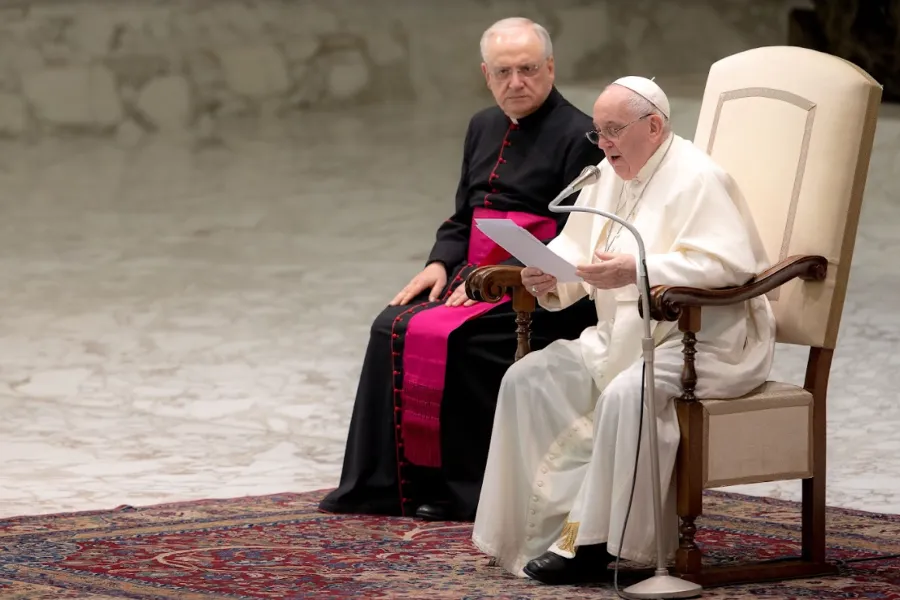
“It is not easy. There are many temptations to seek to impose one’s own model of life as though it were the most evolved and the most appealing. How many errors have been made in the history of evangelization by seeking to impose a single cultural model.”
The pope pointed to examples from Church history in which missionaries who immersed themselves deeply in other cultures were criticized by their contemporaries. He mentioned the 16th-century Jesuit Fr. Matteo Ricci, who spent nearly three decades in China, and another Jesuit missionary, Fr. Roberto de Nobili (1577-1656), who learned Sanskrit and Tamil while ministering in India.
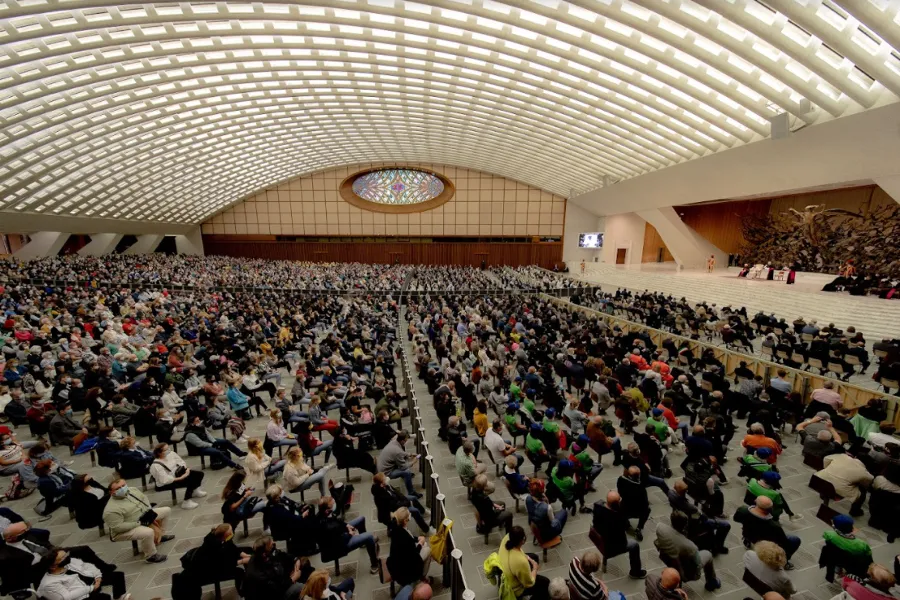
“The liberation obtained through baptism enables us to acquire the full dignity of children of God, so that, while we remain firmly anchored in our cultural roots, at the same time we open ourselves to the universalism of faith that enters into every culture, recognizes the kernels of truth present, and develops them, bringing to fullness the good contained in them,” Pope Francis said.
“To accept that we have been set free by Christ — his passion, his death, his resurrection — is to accept and bring fullness even to the different traditions of every people. True fullness.”
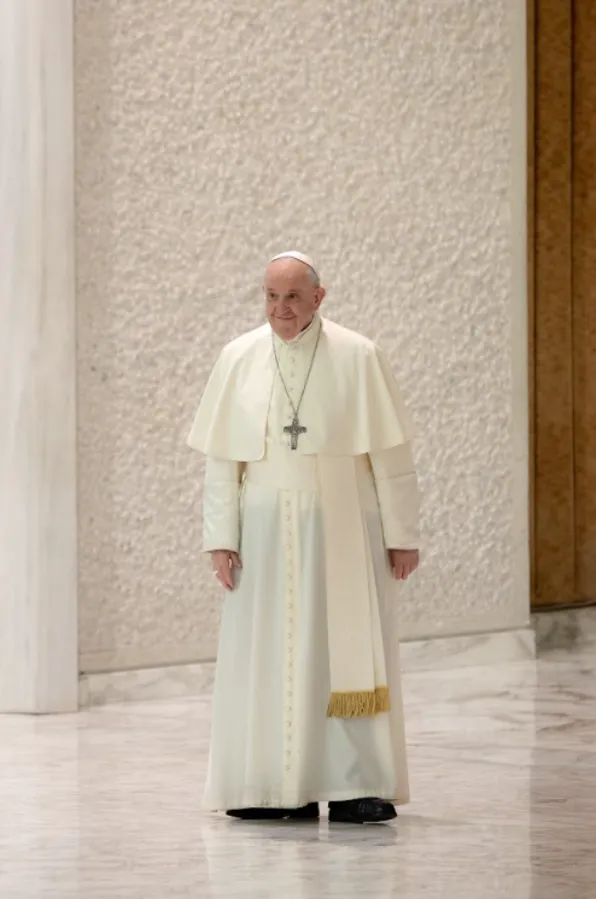
In his 11th live-streamed address in his cycle of catechesis on Galatians, the pope underlined that “uniformity as a rule of life is not Christian.”
“Unity yes, uniformity no,” he said.
Pope Francis said that culture by its very nature is always in “continual transformation.”
“Think about how we are called to proclaim the Gospel in this historical moment of great cultural change, where increasingly advanced technology seems to have the upper hand,” he said.
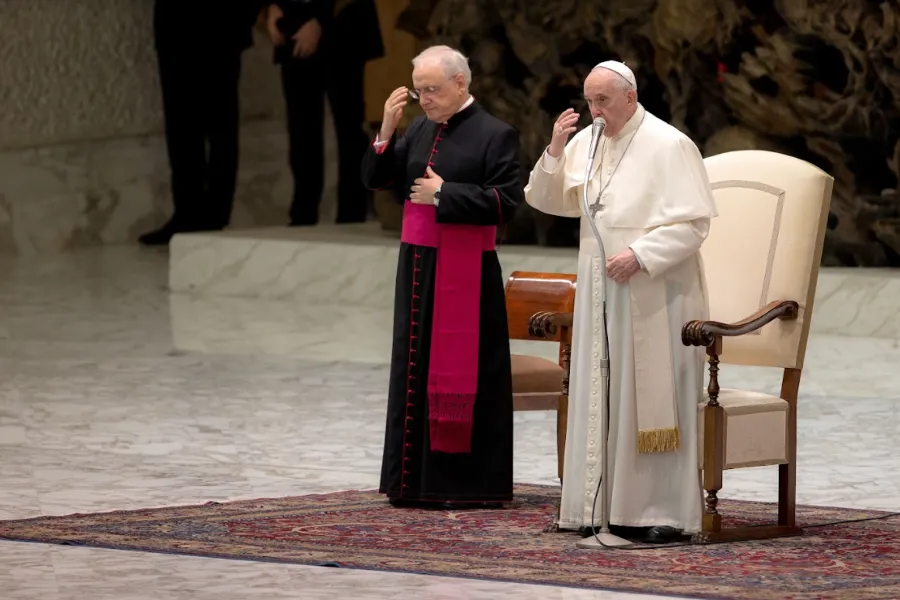
“If we were to speak of faith as we did in previous centuries, we would run the risk of no longer being understood by the new generations. The freedom of Christian faith — Christian freedom — does not indicate a static vision of life and culture, but rather a dynamic vision, a dynamic vision too of tradition. Tradition grows but always with the same nature.”
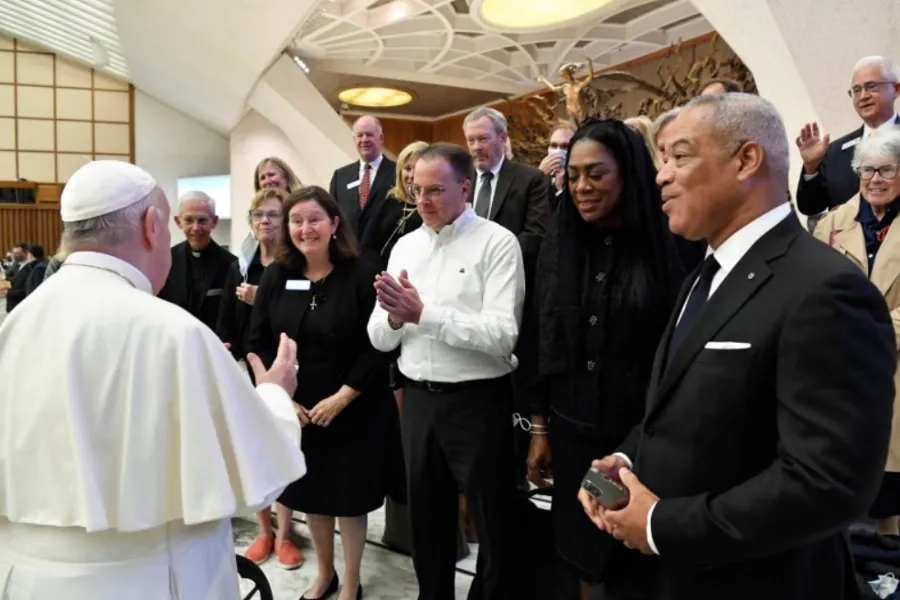
“Let us not claim, therefore, to possess freedom. We have received a gift to cherish. Rather, it is freedom that asks each one of us to be constantly on the move, oriented towards its fullness. It is the condition of pilgrims; it is the state of wayfarers, in continual exodus: liberated from slavery so as to walk towards the fullness of freedom.”
At the end of the audience, Pope Francis greeted American visitors on pilgrimage in Rome.
“I greet the English-speaking pilgrims and visitors taking part in today’s audience, especially the groups from the United States of America. In this month of October, through the intercession of Our Lady of the Rosary, may we grow in the Christian freedom that we received at baptism. Upon all of you, and your families, I invoke the joy and peace of the Lord. May God bless you,” the pope said.
If you value the news and views Catholic World Report provides, please consider donating to support our efforts. Your contribution will help us continue to make CWR available to all readers worldwide for free, without a subscription. Thank you for your generosity!
Click here for more information on donating to CWR. Click here to sign up for our newsletter.





Hearts are lonely hunters when met with constant refusal, like Carson McCullers’ deaf mute rebuffed by circumstances, ends it all. Christ frees us from such unwelcome conditions to love freely because he loved us freely. But there are rules Christ sets as the standards for justice, the realization of what love is. How do we judge, and judge we must if love is just? Can it ever be unjust? The latter is why we have rules. Rigorists if implacable perceive no quarter, while the merciful do. Life if lived with a heart teaches that. Are there exceptions? Reason informs conscience there must. That’s why the Church has tribunals to make a just judgment on the validity of marriage. Although many divorce and remarry are unwilling or unable to. At least we may assume some of these remarriages outside the Church are not adulterous while the remaining are. What is frequently disregarded as many internet comments attest is the previous marriage, the anguish, the abandonment of children often means of support. Mercy must be just. His Holiness, wishing to be most merciful, has set his own standards for justice in Amoris Laetitia. As there may be exceptions to the rule, Francis has constructed two principles that nullify the validity of all marriages. Conscience as an inviolable judge, sacramental marriage as an impossibility. “Conscience can do more than recognize that a given situation does not correspond objectively to the overall demands of the Gospel. It [individual conscience] can also recognize what God himself is asking amid the concrete complexity of one’s limits, while yet not fully the objective ideal” (Amoris 303). Grace is omitted in Amoris 303 as the means to avoid sin, as is responsibility. Regarding the inviolability of sacramental marriage, His Holiness quotes Saint Thomas Aquinas in Amoris 304, “Although there is necessity in general principles, the more we descend to matters of detail, the more frequently we encounter defects. Where there is the same rectitude in matters of detail, it is not equally known to all. The principle will be found to fail, according as we descend further into detail” (ST 1a2ae 94 4). Aquinas is speaking hypothetically on the principle of justice, that the truth is not found in casuistry rather in examining the conditions of the act. Only then can we reach certitude that a certain principle applies. Obviously he believes there are just principles, inviolable principles as there is justice itself. Aquinas believes sacramental marriage is an inviolable principle. He believes adultery cannot be made licit with the presumption that all principles are illicit because we will always find defects that nullify them. Francis’ interpretation is a thoroughly misleading error. What are the effects of this error if not disregard for the tribunal process, the confessional, and the unconditional reception of communion according to one’s conscience in Malta, Sicily, Germany, Philippines, and spreading?
An added comment regarding conscience and the compelling rationale given by Pope Francis for a more merciful approach. While there may be exceptions to the rule, and priests, at least some historically have made exception Francis couches his entire argument in Amoris with the understanding that the only resolution is to offer communion removing the possible basis for exception and making it a rule.
Exactly so. Exceptions to a rule are one thing, but quite another to invent an entirely new moral category where the rules neither apply nor exist. Instead, this [brackets added]:
“A separation, or even an opposition, is thus established in some cases between the teaching of the precept, which is valid and general, and the norm of the individual conscience, which would in fact make the final decision [not judgment] about what is good and what is evil. On this basis, an attempt is made to legitimize so-called ‘pastoral’ solutions contrary to the teaching of the Magisterium, and to justify a ‘creative. hermeneutic according to which the moral conscience is in no way obliged, in every case, by a particular negative precept [thou shalt not]” (Veritatis Splendor, VS, n. 56).
And, earlier: “…the commandment of love of God and neighbor does not have in its dynamic any higher limit, but [!] it does have a lower limit, beneath which the commandment [negative precept] is broken” (VS, n. 52).
Peter, insofar as Amoris Laetitia 304 and the implication that we will find nullifying deficit in all sacramental marriage, the best approach to Amoris 304 and the issue of defects found in the implementation of moral principles, here the insolubility of marriage is to cite the question of Article 4. Whether the Natural Law is the Same in All Men? Aquinas says the more we examine the question we find that men have differing views. That is not to say that all men have different views on natural law, since a consensus is evident in the universal nature of natural law. Hence it’s not the law that changes. Rather either due to deficit of knowledge, for example the patriarchs practiced polygamy without sin unaware of the first principle of monogamy. Marriage to women, even multiple, was within the range of the law. And if a person intent on murder requests the return of a borrowed weapon, although natural law states the obligation to return in this instance we’re not obliged on the grounds of inhibiting murder. Natural law doesn’t change, it’s the accidental deficit often sinful that prevents its fulfillment. Therefore, the natural law of itself, a reflection of the eternal law, doesn’t change. Insofar as marriage, Christ says as instituted from the beginning it was insoluble. Aquinas Ad 1 replies “The Law and the Gospel belong to the natural law, since they contain many things that are above nature, but that whatever belongs to the natural law is fully contained in them. Again, Amoris Laetitia 304 gives the mistaken impression that the further we descend in examining details the more we’re apt to find deficit, and the general principle is found to fail – refers to each individual instance of sacramental marriage. Aquinas instead refers that inconsistency to All Men.
Kudos to you and to Mr. Beaulieu for your analyses. You two have staunch hearts and minds, a lion’s share of fortitude, able as you are to enter the innards of demonic euphemism and return, smelling nice, bearing gifts for those of us not up to the task. Thank you.
We read: “In the call to freedom we discover the true meaning of the inculturation of the Gospel…being able to announce the Good News of Christ the Savior while respecting the good and the true that exist in cultures.”
Yes! And? And…
“Two essential themes [!] are bound up with this view. First, that of the transcendence of revelation in relation to the cultures in which it finds expression. The Word of God cannot, in effect, be identified or linked in an exclusive manner with the elements of culture which bear it. [AND] The Gospel quite often demands a conversion of attitudes and an amendment of customs where it establishes itself: Cultures must also be purified and restored in Christ.”
(This from the International Theological Commission, Introduction to “Faith and Inculturation”,1988: https://www.vatican.va/roman_curia/congregations/cfaith/cti_documents/rc_cti_1988_fede-inculturazione_en.html)
If what Amoris Laetitia is propounding is being based (justified) on neo-Pelagianism and its effects or consequences, it does not say it within its own contents and does not even mention it. So it does not resolve if this was ever part of the Church’s understanding of marriage and what impacts upon it, or, why such an approach would only now have been essential.
To start with I notice at large there is difficulty today in understanding Pelagianism. On the other hand we do not know what cases are behind Amoris Laetitia so as to have a clearer picture what is covered; only select individuals will know. At the same time there is a drive for not keeping the problematic situations somewhat private.
Other heresies put one at odds with baptism. Do they nullify marriage too or is it just the neo-Pelagianism? Pope Francis has some exposure to Orthodox. Is Amoris Laetitia an attempt to align the Roman Catholic Church with the East which permits nullity “at least” for “the first mistake” as a matter of “mercifulness”?
Sacramental marriage is peculiar to the spouses in its unitive aspects, I think. But if an inquiry is wrongly set and kept exclusive to itself, either never examining the vows or making them indifferent, or testing them on things not of their own tenor, it is bound to reach into all kinds of considerations. Deficiencies are bound to be there but at that point they would come into altered mode of measurement and weightiness.
It is crucial since the spouses are an aid to one another and a grace that precisely helps in the baptismal deepening and precisely makes the witness. Amoris Laetitia might speak a bit to some aspects here (parts that I read); however, it’s arguable what is allowed is too generalist, not sufficiently sacramental and way below what some spouses have vowed.
Just a note for clarity Elias. The original question is whether the Natural Law is the same in All Men. When we examine the general principle [universal] we find all men do not consistently hold the same understanding due to some deficit. Francis mistakenly poses the question for individuals, which most individuals do have a common understanding of the Law. Insofar as Marriage and other absolute principles there are likely minor deficits. A deficit in order to nullify a marriage must be sufficiently serious to negate a required condition for marriage. For example, a previous undisclosed unresolved marriage, an undisclosed mental handicap, an undisclosed addiction, a previously arranged undisclosed continuous sexual relationship with another party, a lack of emotional maturity at the time of exchange of vows and the like, evidence of a previous unwillingness to stay in union. A serious deficit [that existed prior to exchange of vows] must be proved before a tribunal for a declaration of nullity.
I heard a bishop say that the sacrament of marriage was from Genesis; and I see that AMORIS LAETITIA opens by rooting marriage in Genesis, “the human couple in its deepest reality” (10). Is this correct?
In March 1994, the Congregation for Divine Worship and the Discipline of the Sacraments promulgated instructions on inculturation with regard to the Roman liturgy.
The Instructions highlight the contradiction between the teaching of VCII, Francis’ Traditionis custodes, and the words of Francis today. Why should the Church take special care to incorporate some types of ‘cultural’ diversity while excluding traditional ‘cultural’ Catholic practices which arose (that too, after ‘death’) organically from within the very bowels of the Church herself?
“Fourth instruction for the right application of the Conciliar Constitution on the Liturgy…
Introduction
1. Legitimate differences in the Roman rite were allowed in the past and were foreseen by the Second Vatican Council in the Constitution on the Sacred Liturgy especially in the missions.[1] “Even in the liturgy the church has no wish to impose a rigid uniformity in matters that do not affect the faith or the good of the whole community.”[2] It has known and still knows many different forms and liturgical families, and considers that this diversity, far from harming her unity, underlines its value.[3]”
Francis’ CT argument against unity consists of his vague claim of a questionnaire administered to some bishops; some bishops claim they never received or responded to such a questionnaire. Without supporting evidence, the claim that bishops see TLM as disunitive proves itself nothing but dust and straw. On the other hand, the argument for the NOM–to make our worship ecumenically appealing–has demonstrated its devastating consequence. The great drift of Catholics, away from the Church, toward noneness and apostasy, occurred only after the institution of the NOM.
The contradictions of Francis will continue into history. One day his confession will be known, lucid, and clear. On that day, justice shall reign. So help us God.